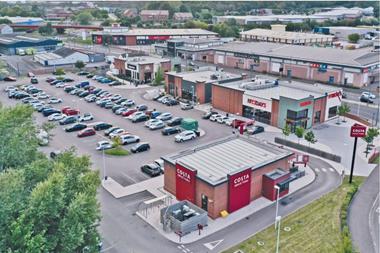Property investors are currently rightly focusing on mitigating the negative impacts of coronavirus.

But the virus has already started to magnify a number of sector trends for the longer term. Some are existing shifts that have been accelerated. The most obvious of these is high street retail, with new reports of non-payment of rent, furloughed staff and significant cashflow problems. The future of many high street outlets looks more uncertain than ever.
Retail distress has left many investors exposed, with any lasting damage to the sector still dependent on how long lockdown lasts. But could there be opportunities once the fear of ‘catching a falling knife‘ abates?
Those with more diverse portfolios could benefit from the changing dynamics in a number of other areas across the property market in the medium to long term.
Warehousing
Retailers selling ‘essential’ goods are reaping the rewards of growing demand, with Kantar data suggesting that March was the best month on record for supermarket sales after shoppers spent an extra £1.9bn on supplies.

This is having a knock-on effect on the industrial and logistics sector, as supermarkets increasingly put out search requirements for large amounts of new warehouse space across the UK in order to satisfy the surge in demand. For example, Aldi is actively seeking an additional 1.2m sq ft of new warehouse capacity, and it is clear that others will also be requiring temporary space to keep the supply chain moving.
Landlords that have maintained flexibility in their warehouse space can expect to see demand hold up. In the long term, too, there is likely to be a trend towards ‘re-shoring’ key elements of the supply chain by increasing domestic production and storage. Both factors are likely to drive demand for logistics and manufacturing space, together with an ever-greater reliance on online retail.
Offices
While mandatory remote working is forcing many organisations to iron out the creases in their digital capabilities, and will probably lead to a more flexible arrangements for employees in future, the crisis is only reinforcing the benefits of good office accommodation and the regular interaction with colleagues that only an office environment can provide.
Some commentators are heralding the necessity of working from home as the beginning of a remote-working revolution that could leave large amounts of centrally located office space redundant. However, we disagree.
Tenants are undoubtedly pressing pause on any commitments to new space in the coming months. There may well be a shift to home working, leading to a lower demand for offices. However, this needs to be weighed up against the need for interaction with colleagues and partners.
Initially, we found video apps such as Microsoft Teams, Zoom and even HouseParty a novelty, but as you will have experienced, video calls do not beat the face-to-face contact that humans need.
Life sciences
The trend towards investment in the UK life sciences sector is also likely to be accelerated by this crisis. The necessity for a strong and agile science and technology sector that can respond quickly has been highlighted by the spread of coronavirus, and now both public and private sector funding is on the increase.
This is unlikely to slow in the coming years and could put significant pressure on the currently restricted supply of purpose-built space in the right locations.
As the pandemic shines a light on the need to invest in research and development, there will clearly be opportunities for those willing to roll up their sleeves and create new space from scratch. In many instances, this could be best achieved by collaborating and working with the world-class universities in the UK, which will also be seeking additional capital and financial resources as a result of this crisis. Real estate investors could be well placed to provide this.
Clearly, few corners of the market are untouched by the current crisis, and disruption in the short term is unavoidable. However, it’s not all doom and gloom. We believe that a number of sectors will show resilience, both in the midst of this crisis and beyond.
The logistics sector should remain buoyant, while office space (both traditional and flexible) should stay in demand as it was before the lockdown and life sciences will see increasing investment. Investors should not be afraid to take advantage of these trends now to reap the rewards in the future.
Manish Chande is senior partner at Clearbell Capital
































No comments yet